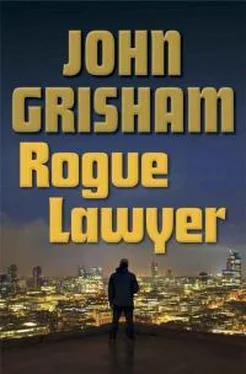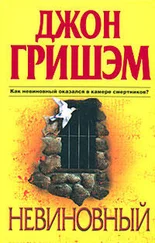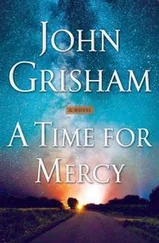He proceeds to make a fool out of Tadeo. When was the first time you went insane? How long did it last? Anybody get hurt the first time? Do you always black out when you go insane? Have you seen a doctor for your insanity? No! Why not! Since you attacked Sean King, have you been evaluated by a doctor, one not connected to this trial? Does insanity run in your family?
After thirty minutes of this assault, the word “insanity” means nothing. It’s a joke.
Tadeo works hard to stay cool, but he can’t help himself. Mancini is practically laughing at him. The jurors seem amused.
Max asks about his record as an amateur boxer. Twenty-four wins, seven losses. Max says, “Now, correct me if I’m wrong, but five years ago when you were seventeen and fighting in the Golden Gloves district tournament, you lost a split decision to a man named Corliss Beane. That right?”
“Yes.”
“Very tough fight, right?”
“Yes.”
“Were you upset by the decision?”
“I didn’t like it, thought it was wrong, thought I won the fight.”
“Did you go insane?”
“No.”
“Did you black out?”
“No.”
“Did you in any way voice your frustration with the decision?”
“I don’t think so.”
“Well, do you remember it or did you lose your memory again?”
“I remember it.”
“While you were still in the ring, did you hit anybody?”
Tadeo shoots me a guilty look that betrays him, but says, “No.”
Mancini takes a deep breath, shakes his head as if he hates to do what he’s about to do, and says, “Your Honor, I have another bit of video that I think might help us here. It’s the end of the fight five years ago with Corliss Beane.”
I stand and say, “Your Honor, I know nothing about this. It was not disclosed to me.”
Max is ready because he’s been planning this ambush for weeks. He says, with great confidence, “Your Honor, it wasn’t disclosed because that was not required. The State is not offering the video as proof of this defendant’s guilt; therefore, under our Rule 92F, there’s no disclosure. Rather, the State is offering the video to challenge the credibility of this witness.”
“Could I at least see it first before the jury sees it?” I ask, slowly.
“That sounds reasonable,” Go Slow responds. “Let’s take a fifteen-minute recess.”
In chambers, we watch the video: Tadeo and Corliss Beane in the center of the ring with the ref, who raises Beane’s right hand in victory; Tadeo yanks away from the ref, walks to his corner, yelling something in an angry fit; he stomps around the ring, becoming more unhinged with each second; he walks to the ropes, screams at the judges, and inadvertently bumps into Corliss Beane, who’s minding his own business and savoring the win; others are in the ring and someone starts pushing; the ref steps between the two fighters and Tadeo shoves him; the ref, a big guy, shoves back; for a second it looks as though the ring is on the verge of chaos, but someone grabs Tadeo and pulls him away, kicking and screaming.
Again, the camera doesn’t lie. Tadeo looks like a sore loser, a hothead, a brat, a dangerous man who doesn’t care if he starts a brawl.
Go Slow says, “Looks relevant to me.”
30.
I watch the jurors as they watch the video. Several shake their heads. When it’s over, the lights come up, and Max gleefully returns to the mock-insanity crap and hammers away. Tadeo’s credibility is thoroughly trashed. I cannot resurrect him on redirect.
The defense rests. Mancini calls his first rebuttal witness, a shrink named Wafer. He works for the state mental health department and has credentials that cannot be questioned. He went to colleges in this state and has our accent. He is not the brilliant expert from afar like Taslman, but he’s quite effective. He’s watched the videos, all of them, and he’s spent six hours with the defendant, more time than Taslman.
I haggle with Wafer until noon but score little. As we are breaking for lunch, Mancini grabs me and asks, “Can I talk to your client?”
“About what?”
“The deal, man.”
“Sure.”
We step to the defense table where Tadeo is sitting. Max leans down and says in a low voice, “Look, dude, I’m still offering five years, which means eighteen months. Manslaughter. If you say no, you really are insane because you’re about to get twenty years.”
Tadeo seems to ignore him. He just smiles, shakes his head no.
He’s even more confident now because Miguel has found the cash and delivered the envelope to Suarez. This, I will learn only after it’s too late.
31.
After lunch we meet in chambers, where Go Slow has on display a plastic plate covered with sliced carrots and celery, as if we’re interrupting her meal. I suspect it’s all for show. She asks, “Mr. Rudd, what about the plea bargain? I understand the deal is still on the table.”
I shrug and say, “Yes, Judge, I have discussed it with my client, as has Mr. Mancini. The kid won’t budge.”
She says, “Okay, we’re off the record here. Now that I’ve seen the evidence, I’m leaning toward a longer sentence, something like twenty years. I didn’t buy the insanity stuff, neither did the jury. It was a vicious attack and he knew exactly what he was doing. I think twenty years is appropriate.”
“May I pass this along to my client? Off the record, of course?”
“Please do.” She drowns some celery in table salt, looks at Mancini, and asks, “What’s next?”
Max says, “I have just one more witness, Dr. Levondowski, but I’m not sure we need him. What do you think, Judge?”
Go Slow bites the end of a stalk. “Your call, but I think the jury is ready.” Chomp, chomp. “Mr. Rudd?”
“You’re asking me?”
“Oh why not?” Max says. “Put yourself in my shoes and make the call.”
“Well, Levondowski is just going to repeat what Wafer said. I’ve crossed him before and he’s okay, but I think Wafer is a far better witness. I’d leave it at that.”
Max says, “I think you’re right. We’ll rest.”
United, a real team.
During Max’s closing argument, I keep glancing at Esteban Suarez, who seems to be thoroughly captivated by his feet. He’s withdrawn into a cocoon and appears to hear nothing. Something has changed with this guy, and for a second I wonder if Miguel has managed to get to him. If not with cash, then with threats, intimidation. Maybe he’s promised a few pounds of cocaine.
Max does a nice job of recapping the case. Mercifully, he does not show that damned video again. He drives home the undeniable point that Tadeo might not have planned his deadly assault on Sean King, but he clearly intended to inflict severe physical injury. He didn’t intend to kill the referee, but in fact he did. He could have thrown one punch, or two, and stopped. Guilty of assault but no major crime. But no! Twenty-two vicious shots to the head of a man who could not defend himself. Twenty-two blows delivered by a highly trained fighter whose admitted goal was to see every opponent leave the ring on a stretcher. Well, he achieved his goal. Sean King left on a stretcher and never woke up.
Max fights off the natural prosecutorial tendency to beat the drum too long. He’s got the jury and he can sense it. I think everybody senses it, perhaps with the exception of my client.
I begin by saying that Tadeo Zapate is not a murderer. He’s lived on the streets, seen his share of violence, even lost a brother to senseless gang wars. He’s seen it all and wants no part of it. That’s why his record is spotless: no history of violence outside the ring. I pace back and forth in front of the jury box, looking at each juror, trying to connect. Suarez looks like he wants to crawl into a hole.
Читать дальше












